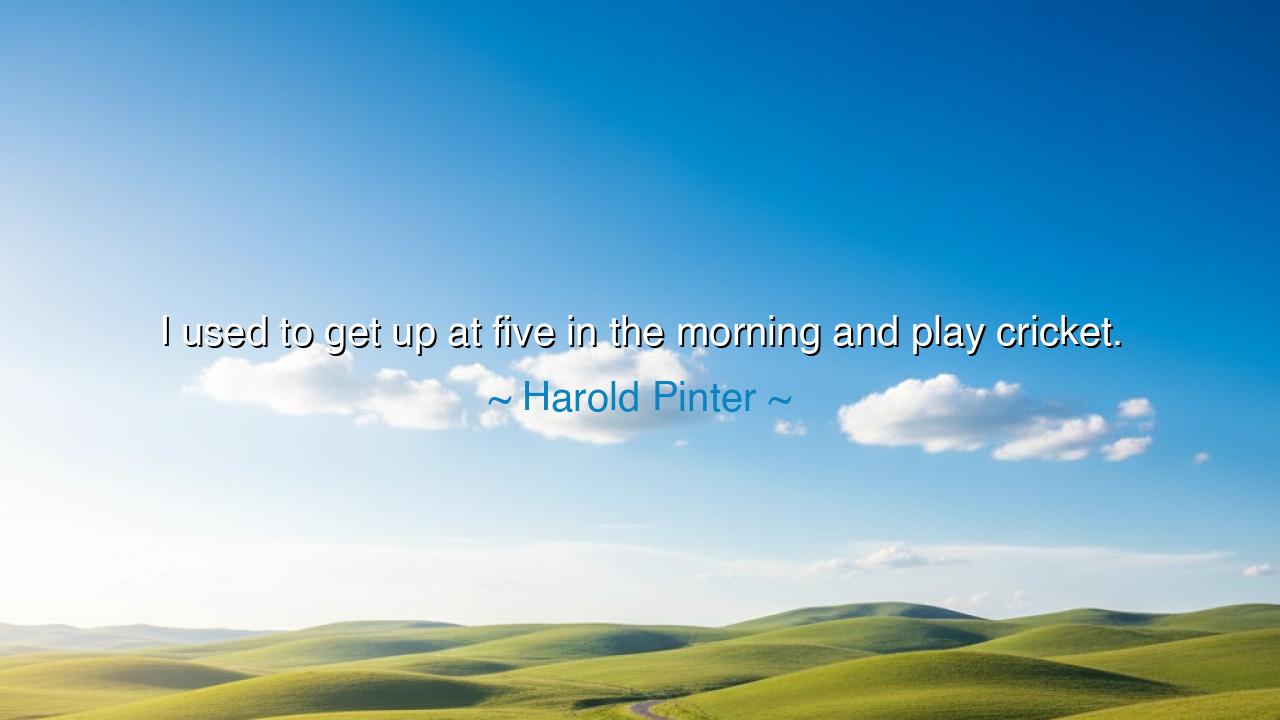
I used to get up at five in the morning and play cricket.






"I used to get up at five in the morning and play cricket." These words from Harold Pinter offer a glimpse into a life that values discipline, passion, and the profound connection between the physical and the mental. To wake at such an early hour, to engage in a game as demanding as cricket, is to embrace a life that does not shy away from effort, but one that revels in the pursuit of excellence. Pinter’s words are not just about a sport; they reflect a deeper philosophy, a commitment to personal growth, to the dedication required to master any craft, whether it is in the arts, in physical endeavors, or in life itself. The act of rising early is a symbol, an ancient practice of preparation, where the body and mind align in their pursuit of something greater.
In the ancient world, heroes like Achilles or Hercules were not born with their abilities but shaped them through years of discipline and training. The warriors of Sparta, too, rose before the sun, engaging in rigorous physical exercise to forge themselves into the finest soldiers of the ancient world. These practices were not just for the body; they were rites of spiritual and mental preparation. For Achilles, it was not simply the training of his physical form that made him a hero, but the development of his character—the strength of mind, the resolve to face adversity. Just as Pinter speaks of early mornings and the discipline of a sport, so too did the ancient heroes understand that true greatness comes not from talent alone, but from the effort we put into our daily lives.
To wake at five in the morning, as Pinter did, is a commitment to a life of purpose. It is a rejection of idleness and the pursuit of something beyond mere convenience. The act of rising early to play cricket is an exercise in self-discipline—a conscious decision to prepare for the challenges of the day ahead. In the ancient tradition, those who sought greatness—whether as warriors, poets, or leaders—understood that time is a precious resource, one that must be seized. Plato, the great philosopher, rose early each day to begin his studies, knowing that the hours before dawn were sacred moments for reflection and learning. Like Pinter, he embraced the dawn as a time to begin anew, a time to sharpen both mind and body.
Cricket, as Pinter mentions, may seem like a simple game, but it is a metaphor for the larger battle of life itself. In cricket, as in life, there is a constant back and forth—the rhythm of effort, the moments of rest, the strategic thinking that guides the player’s every move. It is not a game of mere strength but of patience, precision, and resilience. Sun Tzu, in The Art of War, spoke of the need for careful preparation, of making the most of every opportunity and being ready to face any challenge with strategy and discipline. So too, does Pinter’s early morning ritual reflect the need for preparation in life. The true victory lies not just in the outcome, but in the readiness with which we approach the day, in the disciplined effort we make to perfect our craft, whatever that may be.
Pinter’s words also suggest a deeper wisdom about balance. The act of playing cricket early in the morning does not merely test the body—it also sharpens the mind, offering a way to engage with the world not just physically, but intellectually. The ancient Greeks valued this balance between body and mind, believing that to excel in one without the other was to live an incomplete life. The gymnasiums of ancient Athens were places where both athletics and philosophy were studied, where young men honed their bodies and their minds. In the same way, Pinter’s daily ritual of physical activity was not just about exercise; it was about forging a connection between the mind and the body, about preparing oneself for the struggles of both the physical and mental realms.
The lesson in Pinter’s words is profound: success, whether in sport or in life, requires discipline and dedication. It is not enough to simply rely on natural talent; one must put in the work, day after day, to improve and grow. By rising early, by committing to a routine, by dedicating ourselves to our craft, we develop the resilience and strength needed to face the challenges ahead. The early morning hours are not simply for sleep, but for preparation, for the quiet reflection and effort that give us the clarity and focus to succeed.
In practical terms, this means we must commit to our own personal growth, whatever that may be. Set aside time each day, whether at dawn or in the quiet of the evening, to focus on self-discipline, to prepare for the work ahead. Like Pinter, take time to engage in activities that challenge both your mind and your body. Rise with purpose, approach the day with intent, and understand that greatness is not achieved by waiting for opportunity, but by actively preparing for it. Through this discipline, you will find not only success but the true meaning of effort—the knowledge that each step taken brings you closer to who you were meant to be.






AAdministratorAdministrator
Welcome, honored guests. Please leave a comment, we will respond soon